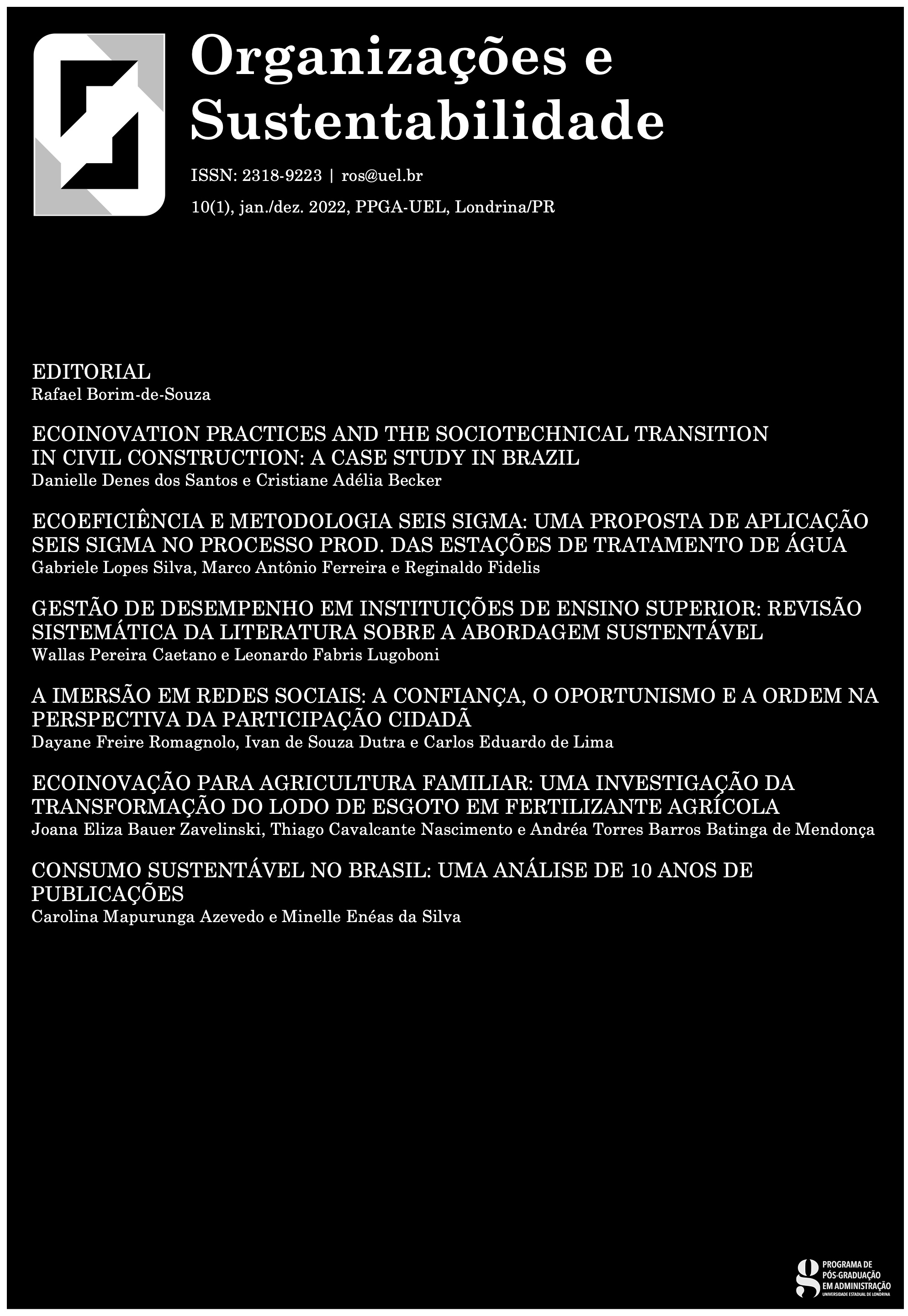IMMERSION IN SOCIAL NETWORKS
TRUST, OPPORTUNISM AND ORDER FROM THE PERSPECTIVE OF CITIZEN PARTICIPATION
DOI:
https://doi.org/10.5433/2318-9223.2022v10n1p55-77Keywords:
Social Immersion, Trust, Opportunism, Order, Citizen ParticipationAbstract
This work aims to understand how the elements of trust, opportunism and order are manifested in social relations arising from citizen participation in the Social Movement for Peace in Londrina (SMPL). The theoretical framework had the following themes: New Economic Sociology and the Immersion of Social Networks, through the elements of Trust, Opportunism and Order, as well as citizen participation in the context of social movements. The methodological course included: qualitative research through case study, whose unit of analysis emerged from the set of actors who are organized in citizen participation actions within the SMPL that, in different perspectives, configured a structure of social relations; conducting interviews as well as using secondary data; and data analysis based on semantic criteria. The elements are manifested in the actions of the SMPL from the network of social relationships formed by the members, which ensures confidence in the development of actions and limits possible opportunistic behavior. When bad faith does not occur or is not perceived, the trust of the actors and their ties are strengthened, promoting order and continuity of the movement, playing a fundamental role in its social process.
Downloads
References
Abers, R., & Von Bülow, M. (2011). Movimentos sociais na teoria e na prática: como estudar o ativismo através da fronteira entre Estado e sociedade?. Sociologias, Porto Alegre, 13 (28), 52-84, set./dez.
Ansell, C. (2003). Community embeddedness and collaborative governance in the San Francisco bay area environmental movement. In: Diani, M., & McAdam, D.
(Eds.). Social movements and networks: relational approaches to collective action.
Oxford University Press.
Ajara, C. (2003). As difíceis vias para o desenvolvimento sustentável: gestão descentralizada do território e zoneamento ecológico-econômico. Rio de Janeiro: Escola Nacional de Ciências Estatísticas. 50 p.
Bardin, L. (2011). Análise de conteúdo. Lisboa: Edições 70.
Beckert, J. (2007). The great transformation of embeddedness: Karl Polanyi and the New Economic Sociology. MPIfG Discussion Paper, 1 (07).
Bernardino, R. A., de Souza Conte, P. P., de Souza Dutra, I., & de Lima, C. E. (2021). Networks of nonprofit organizations and power relations. Revista Pensamento Contemporâneo em Administração, 15(4), 1-22.
Bögenhold, D. (2013) Social network analysis and the sociology of economics: filling a blind spot with the idea of social embeddedness. American Journal of Economics and Sociology, 72 (2), abr.
Caillé, A. (2014). A sociedade mundial no horizonte. In: Nunes, B.; Martins, P. H. A nova ordem social: perspectivas da solidariedade contemporânea. Paralelo 15.
Costa, F. L. da., & Cunha, A. P. (2009). Dilemas da participação cidadã na gestão de políticas públicas. Veredas do Direito, Belo Horizonte, 6 (11), 79-95, jan./jun.
França Filho, G., & Laville, J. L. (2004). Economia solidária: uma abordagem
internacional. Porto Alegre: Ed. UFRGS.
Gaiger, L. I. (2007). A outra racionalidade da economia solidária. Conclusões do primeiro Mapeamento Nacional no Brasil. Revista Crítica de Ciências Sociais, (79), 57-77.
Gaiger, L. I. (2008). A economia solidária e o valor das relações sociais vinculantes. Revista Katálysis, 11(1), 11-19.
Gaiger, L. I. (2012). Por um olhar inverso: prismas e questões de pesquisa sobre a Economia Solidária. Revista Sociedade e Estado, 27(2), 313-335.
Godoy, A. S. (2006). Estudo de caso qualitativo. In Godoi, C. K.; Bandeira-De-Mello, R.; Silva. A. B. da. (Org). Pesquisa qualitativa em estudos organizacionais: paradigmas, estratégias e métodos. São Paulo: Saraiva, 115-146.
Gonçalves, D. M. (2012). As relações sociais pela gênese de uma cooperativa de catadores de resíduos sólidos urbano do norte paranaense sob a perspectiva da imersão social de Granovetter (2007, 1992, 1993). Dissertação (Mestrado em Administração) - Universidade Estadual de Londrina, Londrina.
Granovetter, M. (1973). The strength of weak ties. American Journal of Sociology, Chicago, 78 (6), 1360-1380.
Granovetter, M. (1974). Getting a job: a study of contacts and careers. Cambridge: Harvard University Press.
Granovetter, M. (1985). Economic action and social structure: the problem of embeddedness. American Journal of Sociology, Chicago, 91 (3), 481-510.
Granovetter, M. (1973). The strength of weak ties. American Journal of Sociology, 78(6), 1360-1380.
Granovetter, M. (2007). Ação econômica e estrutura social: o problema da imersão. RAE eletrônica [on-line], 6(1). Recuperado de https://doi.org/10.1590/S1676-56482007000100006. Acessado em: 13 jun. 2021.
Granovetter, M.; Castilla, E.; Hwang, H., & Granovetter, E. (2000). Social networks in Silicon Valley. In: Lee, C. M., Miller, W. F., Hancock, M. G., & Rowen, H. S. (Eds.). The Silicon Valley Edge. Stanford: Stanford University Press, 218-247.
Kirschbaum, C. (2019). Network analysis: emergence, criticism and recent trends. RAUSP Management Journal, 54, 533-547.
Lin, N. (2005). A network theory of social capital. http://proclassic.com/ethnicgv/SN/SC/paper-final-041605.pdf.
Londrina Pazeando. Sobre Nós. (2022). Recuperado de http://londrinapazeando.org.br/quem-somos/.
Massaro, M. L. (2015). A inserção socioeconômica de catadores de recicláveis: a influência de ações econômicas em imersão social de redes sociais. 121f. Dissertação (Mestrado em Administração) - UEL- Universidade Estadual de Londrina, Londrina.
Melo-Silva, G., Lourenço, R. L., & Angotti, M. (2021). Parcerias Público-Privadas: modernização administrativa e relacionamentos econômicos imersos em conflitos de interesse e corrupção. Revista de Administração Pública, 55, 538-558.
Melucci, A. (1989). Um objetivo para os movimentos sociais? Lua Nova, 17, 49-66, jun.
Misoczky, M. C. (2009). Abordagem de redes no estudo de movimentos sociais: entre o modelo e a metáfora. Revista de Administração Pública, 43, 1147-1180, set./out.
Moreira, T. F. O., & Koerner, A. (2021). Vai uma cloroquina aí? A mobilização de enquadramentos sobre a cura da Covid-19. Plural-Revista de Ciências Sociais/USP, 28(2), 294-312.
Piekkari, R., & Welch, C. (2018). The case study in management research: Beyond the positivist legacy of Eisenhardt and Yin. The SAGE handbook of qualitative business and management research methods, 345-358.
Rabelo, D. C., Teixeira, E. C., & Espluga, J. L. (2013). A participação cidadã no plano de bacia do rio Doce: análise a partir do Termo de Referência. G&DR, Taubaté-SP, 9 (3), 184-204.
Raud-Mattedi, C. (2005). Análise crítica da Sociologia Econômica de Mark Granovetter. Política e Sociedade, 6, 59-82, abr.
Singer, P. (2002). Introdução à economia solidária. Fundação Perseu Abramo.
Singer, P. (2004). Desenvolvimento capitalista e desenvolvimento solidário. Estudos Avançados, 18(51), 7-22.
Swedberg, R. (2004). Sociologia econômica: Hoje e amanhã. Tempo Social, 16 (2), 7-34.
Teixeira, E. C. (2002). O local e o global: limites e desafios da participação cidadã. 3 ed. São Paulo: Cortez, 224 p.
Tichy, N., Tuschman, M., & Fombrum, C. (1979) Social network analysis for organization. Academy of Management Review, 4(4), 507-519.
Uzzi, B. (1997). Social structure and competition in interfirm networks: the paradox of embeddedness. Administrative Science Quarterly, Ann Harbor, 4, 35-67, 1997.
Wilmers, N., & Aeppli, C. (2021). Consolidated advantage: New organizational Dynamics of wage inequality. American Sociological Review, 86(6), 1100-1130.
Downloads
Published
How to Cite
Issue
Section
License
Copyright (c) 2022 Organizações e Sustentabilidade

This work is licensed under a Creative Commons Attribution-NonCommercial-NoDerivatives 4.0 International License.
O(s)/a(s) autor(es)/autora(s) transfere(m) todos os direitos autorais do artigo para a revista Organizações e Sustentabilidade, sendo vedada qualquer reprodução, total ou parcial, em qualquer meio de divulgação, impresso ou eletrônico, sem que a prévia e necessária autorização seja solicitada e, se obtida, fará constar o competente registro e agradecimento à revista.












